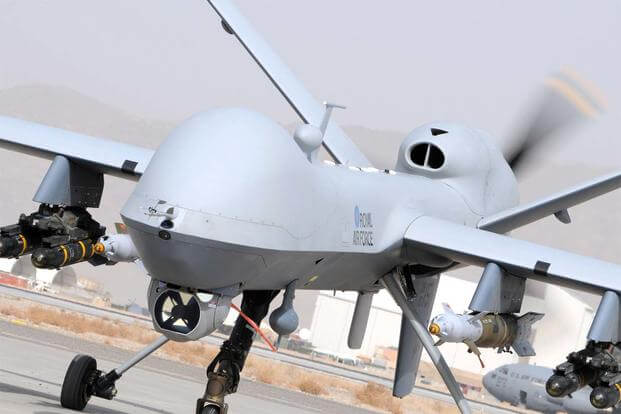British, Danish and Australian warplanes took part in the U.S.-led coalition's airstrike Saturday that reportedly killed more than 60 Syrian government troops and threatened to unravel the "cessation of hostilities," military officials said Monday.
The Syrian army and a key rebel leader declared that the cease-fire had collapsed and blamed each other for violations, but U.S. Secretary of State John Kerry said he was working for a possible extension of the seven-day-old cessation period that ended Monday.
Kerry, in New York City with President Obama for United Nations General Assembly meetings, said, "The basic cease-fire is holding" despite numerous reports of increased shelling, bombing and fighting by all sides in the more than five-year-old Syrian civil war.
State Department spokesman John Kirby said, "We are prepared to extend the cessation of hostilities, while working to strengthen it and expand deliveries of assistance" to Aleppo and other areas that have been blocked at the Turkish border.
"We will be consulting with our Russian counterparts to continue to urge them to use their influence" on the regime of Syrian President Bashar al-Assad, he said.
Kirby said the U.S. was aware that the Syrian army had declared an end to the cease-fire, but "our arrangement is with Russia, which is responsible for the Syrian regime's compliance, so we expect Russia to clarify their position."
The cessation was to have led to a joint cooperation agreement with the Russians on coordinating airstrikes on the Islamic State of Iraq and Syria, or ISIS, and the al-Qaida-affiliated group formerly known as the Al-Nusra Front, but the tentative deal with Moscow was cast into doubt after Saturday's airstrike.
Russia has charged that two U.S. A-10 Thunderbolts and two F-16 Fighting Falcons led the attacks that destroyed Syrian army vehicles and killed troops in northeastern Syria near Dayr Az Zawr, also known as Deir al-Zour and Deir ez-Zor.
"We normally don't discuss the type of aircraft" used in airstrikes, said Maj. Josh. T. Jacques, a spokesman for U.S. Central Command. He said CentCom "regrets" the incident.
The attack, which CentCom called accidental, was the first by the U.S-led anti-ISIS coalition on forces of the Assad regime.
The New York Times, citing U.S. military officials speaking on grounds of anonymity, said the attack lasted about 20 minutes and began with the targeting of vehicles. The aircraft then pursued fleeing troops into the open desert and strafed them, the Times said.
The Australian Ministry of Defense on Sunday said at least one of its aircraft was part of the airstrike, but it was unclear whether the Australian aircraft attacked or was in a support role. In a statement, the Australian Ministry of Defense offered "condolences to the families of any Syrian personnel killed or wounded in this incident."
On Monday, the British and Danish Ministries of Defense put out similar statements acknowledging that their aircraft had participated in the attack against the Syrians.
In a statement Saturday, CentCom said that the coalition aircraft believed they were attacking ISIS positions that "they had been tracking for a significant amount of time before the strike."
"The coalition airstrike was halted immediately when coalition officials were informed by Russian officials that it was possible the personnel and vehicles targeted were part of the Syrian military," CentCom said.
Russia and Syria charged that the attack was evidence that the U.S. was secretly supporting ISIS and was intent on disrupting the cease-fire.
The charges led to angry exchanges Saturday night between Samantha Power, the U.S. ambassador to the United Nations, and her Russian counterpart, Vitaly Churkin.
Power charged that the Russians were "grandstanding" and "pulling a stunt" by calling for an emergency meeting of the U.N. Security Council.
Churkin said, "There is no point in my listening to Ambassador Power." He called the airstrike "frankly suspicious. I would suggest it was not accidental."
-- Richard Sisk can be reached at Richard.Sisk@Military.com.




























